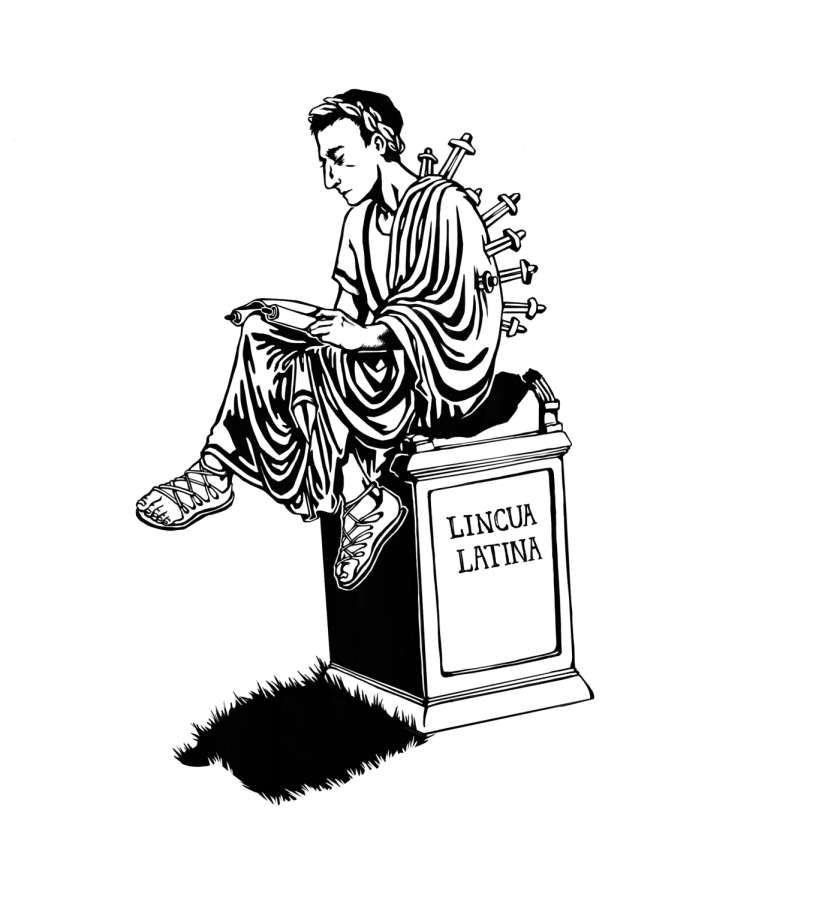Latin’s Not Dead…It’s Undead
Of all the languages at Lakeside, the one that is subject to the most ridicule as useless, irrelevant, and even dead, is Latin. For those seeking a lucrative career as a Vatican Latinist, Latin fluency could not be more necessary; yet, Lakeside students seem to prefer more modern “living” languages, such as Spanish and Mandarin. In order to remind Lakesiders of Latin’s timeless appeal, I have interviewed the Latin teacher (and internet-ordained reverend), Magister Searl. As any Lakeside Latin student knows, Magister Searl’s teaching is an art form, so I have formatted this interview to maintain the clarity of his answers.
Latin opens up the story of language.
PM: What makes Latin useful to those who take it?
MS: I’m sure there’s lots of uses for it, but use is pretty low down on my list of motivating factors. I think that it’s beautiful. It’s exciting. It gives me a sense of wonder and discovery. I’m sure there are lots of uses. You learn a bunch of words, it makes you a better writer, a better thinker. It pushes you intellectually, but none of those are motivating enough. Learning Latin is pretty hard, and for any one of those useful things, there’s an easier way to accomplish them than learning another language. Latin is useful, but I always have to push back on that question because I think it’s way more than being useful. Latin opens up the story of language; you get to understand that language has been around for a long time, and we speak one version of it.We have been, as a species, grappling with our relationship with language all along.
PM: Why do you think Latin is such a polarizing language? Why do some love it and others scorn it?
MS: One answer to that question is pretty easy: because it’s hard. For lots of video games, the very first page is a difficulty selector: there are people that will play it on hardcore mode, and others who will say, “Just give me the story. I don’t want this to be a hard thing.” There’s not really an easy mode for Latin. There are people who love that; there are video games that draw people in because they are hard, and Latin’s like that. You have to want it to be what it is. If you want Elden Ring to be Animal Crossing, it’s not going to work for you. I think everyone wants something to be hard, but maybe you want your sports practice to be hard. Or maybe you’ve worked really, really hard at some math problem, and you finally solve it. That’s so satisfying. If you make everything in life hard, you’re probably just going to be really tired. It’s not going to be worth it, so you’ve got to want your language experience to be kind of hard.
PM: How has learning Latin and immersing yourself in its literature changed the way you see the world?
MS: I think it’s impossible to really learn another language without learning another culture. One of the coolest things about language study is that, at its base, it’s an act of empathy. You have to see the world in different shoes and experience a different perspective, and it’s so cool to realize the extent to which my beliefs are contingent upon the accident that I was born in North America in the 20th century. Learning another language then allows me to see what worldviews are human worldviews and what worldviews are just contingent upon when and where you were born.
Sometimes knowing Latin is a linguistic superpower. It’s like x-ray vision for language. Somebody else can read something, and then I can read the same thing, and I can see things in it that they don’t see. I think that’s what bird watching is like. It’s an observational superpower. Everywhere I go, I am accompanied by birdsong and bird behavior. There’s so much happening out in the world everywhere, and everyone is walking right by it. There are so many nesting species on campus you can see just in a walk from Bliss Hall to the Refectory, and it feels like a superpower to see all that. That’s what I think about Latin, too. It’s so cool to have this superpower for reading, and I want everyone to experience it.
PM: Is Latin a dead language?
MS: Latin is certainly a dead language. There are people who speak it really, really fluently, but they also speak some other language fluently, so it’s no one’s native language, but it’s a really good foundation and tool for learning other living languages. When you’ve learned those other modern languages, and you’re speaking to someone in the language they’ve spoken from birth, that’s such a cool cultural interaction. You can’t really have that in Latin. You can’t engage with Latin culture on its own terms, so I do think it would be a shame if the only foreign language you studied was Latin. Yes, it’s probably dead. Maybe it’s like a zombie. It’s an undead language, which is fun. You can bring it back and do stuff with it. You can have whole conversations, you can write books, but because it’s no one’s first language, it’s also not bound up in anyone’s culture. Somebody else can read something, and then I can read the same thing, and I can see things in it that they’re not seeing.
To claim that Latin is as “alive” a language as French, Spanish, or Mandarin would be to fight a losing battle, something Caesar would not approve of. Even so, the fact that Latin continues to be taught and adored by its cult of highschoolers is proof of its charm. It is the ultimate flex of Latin that its corpse can still contend with the living bodies of modern languages.


